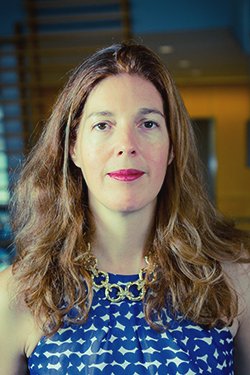Leslie B. Vosshall
2007 Regional Award Winner — Faculty

Current Position:
Robin Chemers Neustein Professor
Institution:
The Rockefeller University
Discipline:
Neuroscience

Current Position:
Robin Chemers Neustein Professor
Institution:
The Rockefeller University
Discipline:
Neuroscience
Recognized for: Identifying the genes that mediate odor and carbon dioxide perception in insects
Areas of Research Interest and Expertise: Neuroscience, Chemo sensation, Mosquito Host-Seeking Behavior, Feeding Behavior
Biography:
PhD, Molecular Genetics, HHMI-The Rockefeller University
BA, Biochemistry, Columbia University
The overall goal of work in Dr. Vosshall’s laboratory is to understand how complex behaviors are modulated by external chemosensory cues and internal physiological states. Her lab takes a multi-disciplinary approach spanning cell biology, genetics, neurobiology and behavior. Their early focus has been to study how the brain interprets olfactory signals in the environment that signal food, danger, or potential mating partners.
Dr. Vosshall and her team have been studying these problems in three model organisms: the fly, the mosquito and the human. The majority of the early work in her laboratory was carried out in the genetically tractable fruit fly, Drosophila melanogaster, which displays a rich repertoire of chemosensory behaviors despite having a nervous system with only 100,000 neurons. Dr. Vosshall has studied the functional neuroanatomy of the olfactory system, how this system perceives sex pheromones, and the structure and function of the insect odorant receptors.
Dr. Vosshall has recently expanded her research focus in three major directions. First, her lab will be establishing a mosquito genetics research program to understand host-seeking and blood-feeding behavior in the mosquito. Second, they will be carrying out large-scale human subjects’ research to combine olfactory psychophysics with genetic analysis to understand the mechanisms of olfactory perception in humans. Third, Dr. Vosshall and her team are getting increasingly interested in the links between olfaction and feeding behavior and hope to use Drosophila as a powerful model to understand how smell intersects with hunger and satiety in all animals.
“The long-term goal of all of our work is to understand how behaviors emerge from the integration of sensory input with internal physiological states.”
Key Publications:
Other Honors:
2011 Gill Young Investigator Award
2010 Dart/NYU biotech Award
2009 Lawrence C. Katz Prize, Duke University
2005 New York City Mayor’s Award for Excellence in Science and Technology
2005 Irma T. Hirschl/Monique Weill-Caulier Trusts Research Award
2002 Presidential Early Career Award for Scientists and Engineers
2002 John Merck Fund Scholar
2001 Arnold and Mabel Beckman Foundation Young Investigator
2001 National Science Foundation Faculty Early Career Development Award
2001 McKnight Scholar Award in Neuroscience
In the Media:
Research suggests how mosquitoes evolved an attraction to human scent. November 12, 2014
Leslie Vosshall on the BBC Naked Scientists radio show discusses trillion odors paper. Naked Scientists. March 25, 2014
Humans can discriminate more than 1 trillion odors. Storyfy. March 20-23, 2014
Human nose can detect at least 1 trillion odors — far more than thought, says study of smell. Washington Post. March 20, 2014
The Nose Knows: Humans Can Smell More Than 1 Trillion Scents. LiveScience. March 20, 2014